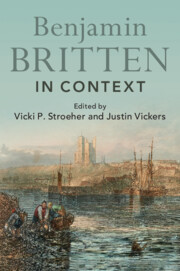Book contents
- Benjamin Britten in Context
- Composers in Context
- Benjamin Britten in Context
- Copyright page
- Dedication
- Contents
- Figures
- Tables
- Notes on Contributors
- Acknowledgements
- Bibliographic and In-Text Abbreviations
- Prologue
- Part I The Britten Circle(s)
- Part II British Musical Life
- Part III Britten and Other Composers
- Part IV Wordsmiths, Designers, and Performers
- Part V British Sociocultural, Religious, and Political Life
- Chapter 34 English and British National Identity in the Arts
- Chapter 35 The Place Within
- Chapter 36 Monarchy, Royalty, and Arts Patronage
- Chapter 37 Literary Leanings
- Chapter 38 Faith, Spirituality, and the Church
- Chapter 39 The Politics of the Closet
- Chapter 40 Communism, Socialism, and Pacifism in British Politics
- Epilogue Britten’s Legacy
- Further Reading
- Index
Chapter 34 - English and British National Identity in the Arts
from Part V - British Sociocultural, Religious, and Political Life
Published online by Cambridge University Press: 31 March 2022
- Benjamin Britten in Context
- Composers in Context
- Benjamin Britten in Context
- Copyright page
- Dedication
- Contents
- Figures
- Tables
- Notes on Contributors
- Acknowledgements
- Bibliographic and In-Text Abbreviations
- Prologue
- Part I The Britten Circle(s)
- Part II British Musical Life
- Part III Britten and Other Composers
- Part IV Wordsmiths, Designers, and Performers
- Part V British Sociocultural, Religious, and Political Life
- Chapter 34 English and British National Identity in the Arts
- Chapter 35 The Place Within
- Chapter 36 Monarchy, Royalty, and Arts Patronage
- Chapter 37 Literary Leanings
- Chapter 38 Faith, Spirituality, and the Church
- Chapter 39 The Politics of the Closet
- Chapter 40 Communism, Socialism, and Pacifism in British Politics
- Epilogue Britten’s Legacy
- Further Reading
- Index
Summary
Throughout much of his career, Benjamin Britten was acclaimed both as the most significant English composer in centuries and as an artist whose music embodied an innate Englishness. Notwithstanding the subject matter and sources of many of his works, Britten himself resisted association with what were often vague – and frequently contradictory – assumptions about the very definition of that Englishness. While Britten accepted commissions from major national institutions throughout his career, he was also openly suspicious of prevailing attempts to align contemporary creative expression with a proudly English or British identity. This essay explores the origins of those attempts in the nineteenth century and traces some of their most prominent, influential manifestations in the institutions and artistic practices of the twentieth century.
Keywords
- Type
- Chapter
- Information
- Benjamin Britten in Context , pp. 303 - 310Publisher: Cambridge University PressPrint publication year: 2022

